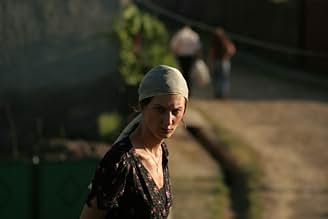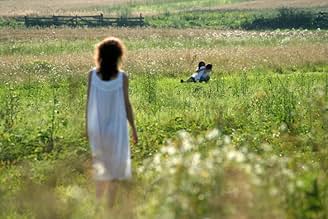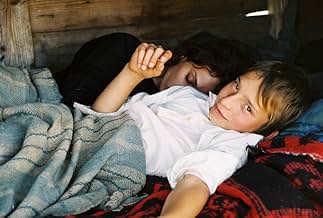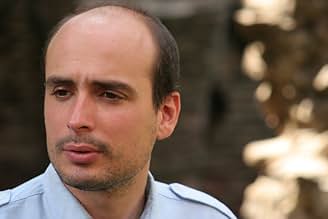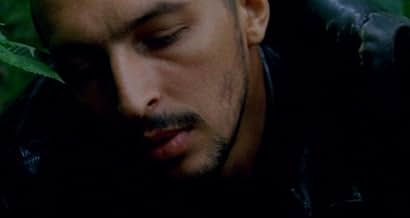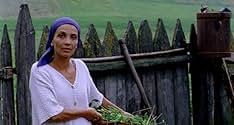Katalin Varga
- 2009
- 1h 22min
VALUTAZIONE IMDb
7,0/10
3166
LA TUA VALUTAZIONE
Aggiungi una trama nella tua linguaKatalin, a woman raped in the Carpathian Mountains, seeks revenge with a boy, questioning morality's complexities as she confronts her past.Katalin, a woman raped in the Carpathian Mountains, seeks revenge with a boy, questioning morality's complexities as she confronts her past.Katalin, a woman raped in the Carpathian Mountains, seeks revenge with a boy, questioning morality's complexities as she confronts her past.
- Premi
- 14 vittorie e 16 candidature totali
Tibor Pálffy
- Antal Borlan
- (as Tibor Pálfy)
Recensioni in evidenza
The beautiful Transylvanian countryside, where a thin veil of modernity covers a continuing peasant lifestyle for many, is the setting for Peter Strickland's short, unsentimental film 'Katalin Varga' about the aftermath of a rape. It's a quiet movie, strikingly shot, that offers no pretence of life easier than it actually is. To me, it seemed that the reaction of the perpetrator's wife seemed simultaneously slightly overdone (in terms of motivation) and underplayed; one might also suggest that the ending is not especially satisfying, probably because the film never lets us know exactly what it is that Katalin is hoping for. This can be justified, however, because it's completely plausible that the character doesn't know herself. In a nutshell, this is a revenge movie; but so much more interesting that most of what we see in this genre.
't easy to follow, since a lot of the plot and background story is told little by little.
But the visuals is enough to watch this film. The cinematography and composition is something I haven't seen in a while. I gather the film was shot on 16mm, but that doesn't bother at all. On the contrary, it gives a small personality to the film.
The only weaknesses which I found were in the script. It's somehow difficult to follow, although understandable. But, because it was difficult to follow, it was difficult to get emotionally attached.
But as an art house film, it is a must see. Maybe not for the big public, but for the film buff.
But the visuals is enough to watch this film. The cinematography and composition is something I haven't seen in a while. I gather the film was shot on 16mm, but that doesn't bother at all. On the contrary, it gives a small personality to the film.
The only weaknesses which I found were in the script. It's somehow difficult to follow, although understandable. But, because it was difficult to follow, it was difficult to get emotionally attached.
But as an art house film, it is a must see. Maybe not for the big public, but for the film buff.
I missed this first time round and am so glad I caught up with it at an afternoon showing at a local independent cinema. Even more encouraging was that I expected to be the only person there but, although only a smattering of people (in a large auditorium), there were enough to create an atmosphere (that may be in my head but hopefully some people will get what I mean). So, transfixed by Hilda Peter from the outset, the film moved beautifully through dreamy countryside as the revelation of a hidden secret drove Katalin and her son away from their marital home. The menacing undertone haunted their journey to remote villages, the audience waiting for the inevitable vengeance to erupt. The nature of the film and its brutal climax prompted something I love to see as the credits rolled. No one moved or spoke. If the audience is out of their seats the second the picture fades I feel either they're relieved the film has finished or have weak bladders or a drink problem. Katalin Varga was successful in conquering the audience, an endorsement of its quality. See it.
I borrowed the DVD from a local store, being sure that this is going to be a good movie. I read good reviews of it. Now I'm quite disappointed after seeing it. The movie is good enough until the scene where the woman is telling her rape experience finishes. The story of the rape is the best part. As the camera focused on the characters' faces, Katalin tells her horrific story, disconnected from the suffering that we would expect. That gives the character a lot of power. She is in a position of control, she overcame the bad experience and her main weapon is the truth, because the truth will really ruin the precious relationship of Katalin's aggressor with his wife. The story of the rape is told in such intimate detail, that you may feel various emotions, like empathy, justice being done, concern for any of the characters, each of them may be in a dangerous position. The situation is very much like one from Sadoveanu's novel "Baltagul". After this wonderful artistic moment, the rest of the movie is full of broken links. The man's regret for what he has done is very unrealistic, not that this might not happen in real life, but his state is not supported by the play and the character's story. Then, the suffering for the loss of his wife is too short. The wife, a devoted Christian, commits suicide (that's possible, but not very probable) without many explanations given to us. The man suffers too little after that because he is quite preoccupied with his relation with Katalin and her son. Many other disharmonious details disconnected me from the movie. I also have some personal regrets, that the Romanians in the movie are all mean characters. There's no obvious reason in a movie where 99 percent of the time you have Hungarian language speaking, only three short but significant dialogues are in Romanian. In one of them we have the girls eating sunflower seeds that are not helping the strangers in need without judging or mocking them. Eating sunflowers in public in Romania is associated with low class, specially because it's a Balkan habit mostly associated with gypsies. Speaking of gypsies, I can not get over the idea that the first victim of Katalin is associated with Gypsies and undoubtedly this is part of the construction of an evil character. The other two scenes with Romanians are the ones involving the vengeful criminals, one of them showing a twisted faith in God. Anyway, it could have been a good movie, but amateurish errors and a bit of xenophobia (I suppose) ruined it for me. I may keep in mind as good parts: landscapes, music and the boat scene.
Having already seen and very much enjoyed this director's Berberian Sound Studio and prior to seeing his latest, The Duke Of Burgundy, decided to check out this, his first feature. Glad I did, seems it didn't get a theatrical release in UK, which is a travesty. Great little film, very focused, very intense, with a stunning central performance from Hilda Peter. Problems in her village prompt her to take off with her son and traverse the Carpathians and maybe exorcise her devils. Always very good to look at, this also has what has become a Strickland trademark, amazing score. The tinkling cowbells, echoing across the fields or the creak of the horse and cart carrying them both find their way unobtrusively into the score. Always engrossing, the central sequence where the main character explains graphically what happened to her as their boat slowly spins on a lake is spellbinding and so very effective. Excellent.
Lo sapevi?
- QuizThe film was shot in Romania in July 2006 for around £25,000 with a small crew of 11 people (including transport and catering). Strickland paid everyone on the 17-days-shoot himself, apart from the focus-puller, who agreed to work for free. The whole crew and the actors lived together in an empty house in a small village in the Carpathian Mountains. After the shoot Strickland ran out of money while editing. He approached many UK production companies, but the reaction was always negative because an obscure film by an unknown director, not even in the English language, seemed to put off all UK investors. Only two Romanian producers, Oana Giurgiu and Tudor Giurgiu, paid attention. They saw Strickland's rough cut and came on board as co-producers, providing the funds to make a proper sound-mix and a blow-up from the Super-16mm negatives to 35mm. It was then invited and shown in competition at the '59th Berlin International Film Festival' in 2009 and won the 'Outstanding Artistic Contribution' award for the creative sound design. Without the Romanian producers, the film would never have been properly finished.
- ConnessioniReferenced in Cowboy (2017)
- Colonne sonoreThe Grave and Beautiful Name of Sadness
- excerpts taken from "The Sadness of Thing"
Written by Steven Stapleton and David Tibet
Performed by Steven Stapleton and Geoff Cox
I più visti
Accedi per valutare e creare un elenco di titoli salvati per ottenere consigli personalizzati
- How long is Katalin Varga?Powered by Alexa
Dettagli
- Data di uscita
- Paesi di origine
- Sito ufficiale
- Lingue
- Celebre anche come
- 卡塔琳的秘密
- Luoghi delle riprese
- Aziende produttrici
- Vedi altri crediti dell’azienda su IMDbPro
Botteghino
- Lordo in tutto il mondo
- 28.399 USD
- Tempo di esecuzione1 ora 22 minuti
- Colore
- Mix di suoni
- Proporzioni
- 1.85 : 1
Contribuisci a questa pagina
Suggerisci una modifica o aggiungi i contenuti mancanti



